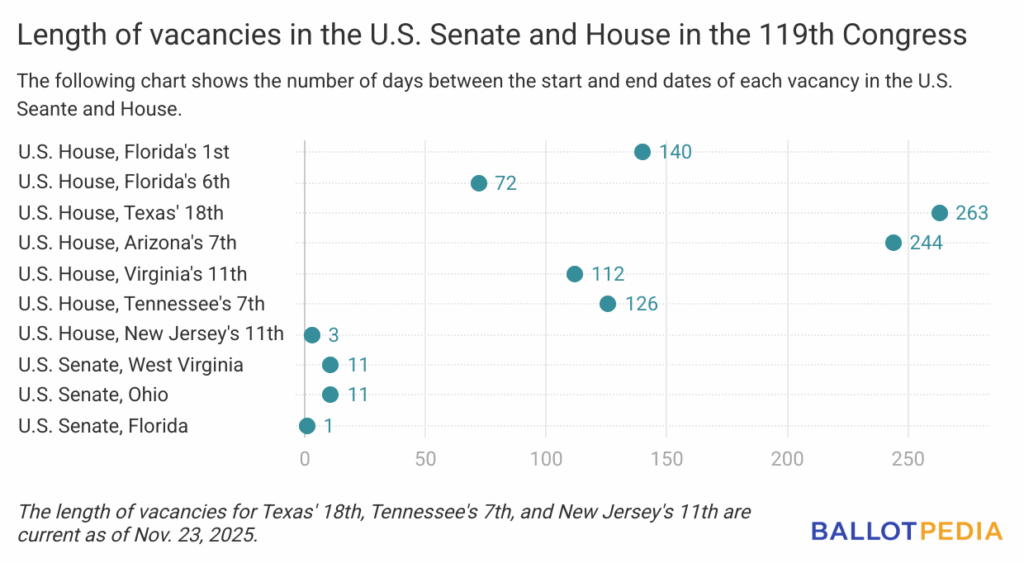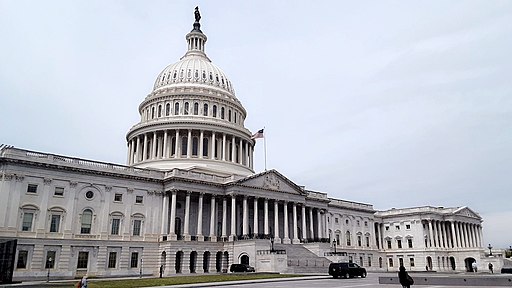On Nov. 20, 2025, Mikie Sherrill (D) resigned from the U.S. House of Representatives to prepare to serve as governor of New Jersey, leaving New Jersey’s 11th Congressional District vacant. On Nov. 4, 2025, Sherrill won the general election for governor of New Jersey, defeating Jack Ciattarelli (R) 56% to 43%. She will assume office on Jan. 20, 2026.
Following Sherrill’s resignation, New Jersey Gov. Phil Murphy (D) set the special election date to fill the vacancy for April 16, 2026, with primaries on Feb. 5, 2026.
The vacancy now brings the Republican majority in the chamber to 219 to 213, with three vacancies.
Sherrill’s resignation marks the sixth time since April 24, 2024, that a seat in New Jersey’s congressional delegation has been vacant:
- New Jersey's 10th Congressional District was vacant for 152 days after Rep. Donald Payne Jr. (D-N.J.) died on April 24, 2024.
- New Jersey's 9th Congressional District was vacant for 135 days after Rep. Bill Pascrell (D-N.J.) died on Aug. 21, 2024.
- New Jersey's 3rd Congressional District was vacant for 26 days after then-Rep. Andrew Kim (D-N.J.) resigned Dec. 8, 2024, in order to represent New Jersey in the U.S. Senate.
- One of New Jersey’s two U.S. Senate seats was vacant for 20 days after Sen. Bob Menendez Sr. (D-N.J.) resigned on Aug.16, 2024, after being convicted on 16 counts of federal corruption charges.
- The U.S. Senate seat became vacant again for one day after Sen. George Helmy (D-N.J.) resigned on Dec. 8, 2024, allowing Kim to take office early.
Sherrill’s electoral history in New Jersey’s 11th Congressional District
In 2018, Sherrill ran for her first term in the U.S. House in New Jersey’s 11th Congressional District after incumbent Rep. Rodney Frelinghuysen (R) announced that he would not seek re-election.. In the general election, she defeated Jay Webber (R) 57% to 42%. In her three subsequent re-election bids in the district, Sherrill won by six percentage points in 2020, 19 percentage points in 2022, and 15 percentage points in 2024.
Vacancies in the 119th Congress
So far in the 119th Congress, there have been seven vacancies in the U.S. House and three in the U.S. Senate. Of those vacancies:
- Two in the U.S. Senate were filled via appointment.
- One in the U.S. Senate was filled when Sen. Jim Justice (R-W.Va.) was sworn into office 11 days after the start of the 119th Congress. Justice delayed his swearing-in in order to fulfill the remainder of his term as governor of West Virginia.
- Four in the U.S. House were filled after special election winners were sworn in.
As of Nov. 23, the vacancies in New Jersey’s 11th Congressional District, Texas' 18th Congressional District, and Tennessee's 7th Congressional District have not been filled.
Of the 10 vacancies, the longest is the vacancy in Texas' 18th Congressional District, which has been vacant since the death of Rep. Sylvester Turner (D-Texas) on March 5. As of Nov. 23, the district has been vacant for 263 days.

Congressional vacancies since the 113th Congress
During the 113th through 118th Congresses, there were 88 vacancies in the U.S. House and 19 in the U.S. Senate. The average length of a vacancy in the U.S. Senate during that period was six days. The average length of a vacancy in the U.S. House during that period was 138 days.
The longest vacancy in the U.S. Senate during that period was in New Jersey. The vacancy occurred during the 118th Congress, when Sen. Bob Menendez (D-N.J.) resigned on Aug. 20, 2024. Following Menendez's resignation, the seat was vacant for 20 days.
The longest vacancy in the U.S. House during that period was in Michigan's 13th Congressional District. The vacancy occurred during the 115th Congress, when Rep. John Conyers, Jr. (D-Mich.) resigned on Oct. 27, 2019. Following Conyers' resignation, the seat was vacant for 359 days.



